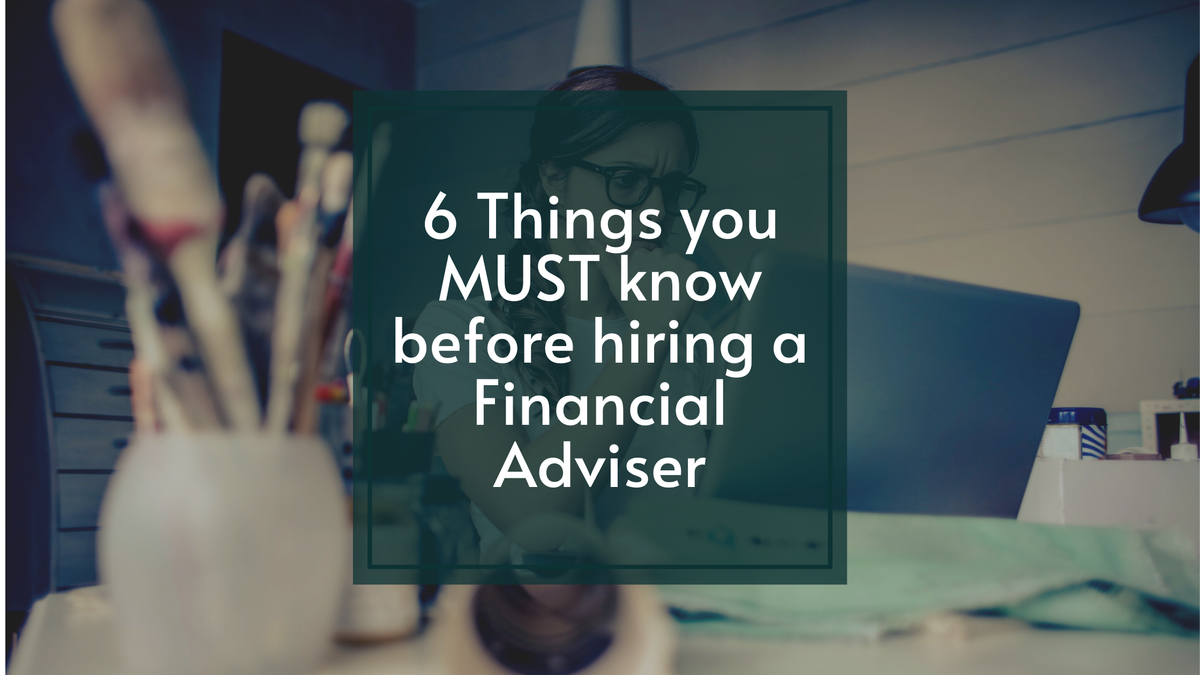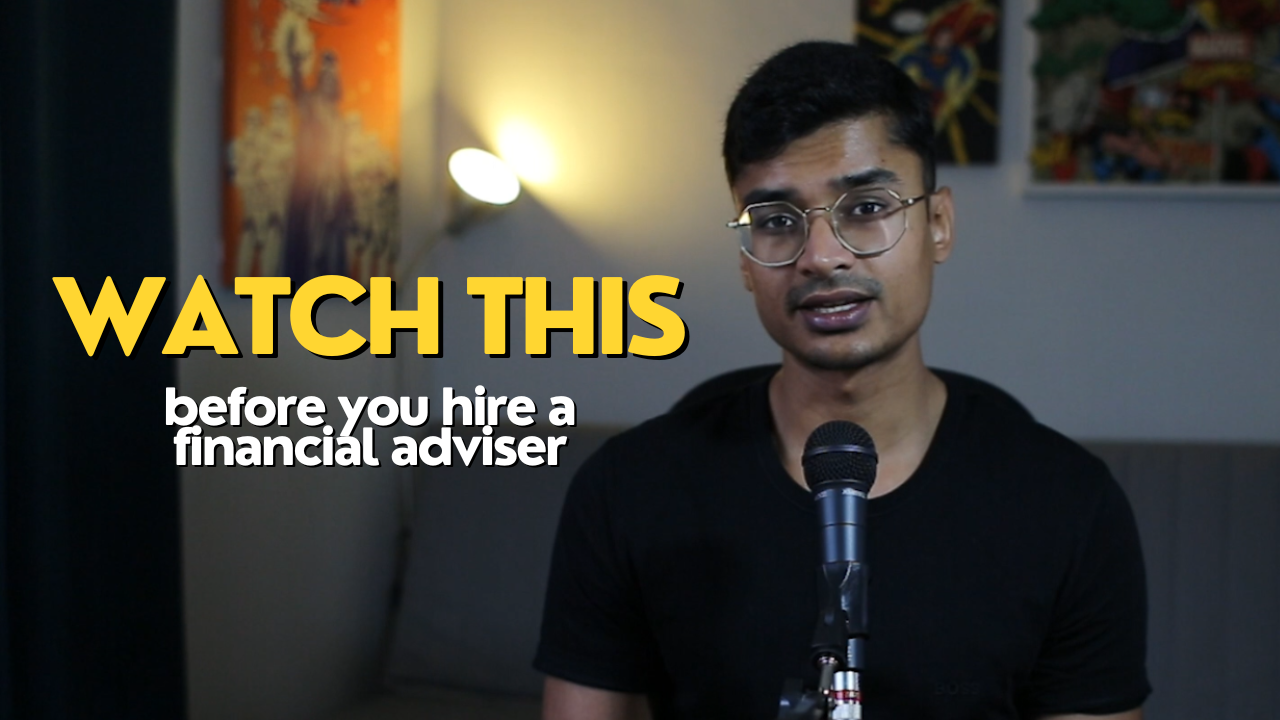6 Things you MUST know before hiring a Financial Adviser
Organising and managing your finances is something that everyone finds challenging, however it is so so important for you to take control of your money.

Organising and managing your finances is something that everyone finds challenging, however it is so so important for you to take control of your money. From budgeting to saving, investing, and planning for retirement, planning your financial future is a critical step towards achieving financial stability and peace of mind.
Prefer to watch? Check out my youtube video instead:

Value of Seeking Professional Financial Advice
This is where the expertise of a financial adviser becomes crucial. Contrary to popular belief, financial advisers aren't just for the wealthy; they are there for anyone who wants to manage their finances more effectively. From investment strategies to navigating significant life events, they provide specialised advice to help you make informed financial decisions. Let's dive into the six essential things you need to know before consulting a financial adviser.
1. Knowing Your Reasons for Seeking Advice
When life throws significant events your way – like getting marries, welcoming a new family member, buying a property, or switching careers – it's often a signal to seek financial advice. These milestones aren't just personal; they can really impact your financial planning, typically calling for a reassessment of your financial strategy. Recognising these life changes as triggers is crucial in navigating your financial journey effectively.
Before meeting with a financial adviser, it's important to have a clear idea of what you're aiming for. Are you looking to secure your retirement, need guidance on investments, want to get better at budgeting, or reshape your financial habits? Identifying your goals shapes the advice process.
2. Being Prepared for the Initial Meeting
For your first meeting with a financial adviser, being well-prepared is key. Start by creating a comprehensive summary of your current financial situation. This should include your assets, liabilities, income, and expenses. Having this information gives your adviser a solid foundation to understand where you're at financially.
Also, gather all necessary documents like tax returns, bank statements, investment reports, insurance policies, and any estate planning documents. These details are crucial for developing an accurate financial plan. Remember, this initial meeting is as much about building a rapport with your adviser as it is about the numbers. It's your opportunity to see if you click with them and if their approach meets your needs and expectations.
3. Understanding the Advice Process
When you first contact a financial adviser, it's good to know that the initial consultation is usually free. This is a no-obligation chance for both you and the adviser to see if there's a good fit.
The financial advice process generally unfolds in three main stages: planning, implementation, and ongoing service. Planning involves developing your financial strategies, implementation is about putting these plans into action, and ongoing service means regular reviews and adjustments to keep everything on track. A skilled adviser is invaluable here, using their expertise to navigate complex financial scenarios and tailor strategies to your specific needs.
4. Clarifying Fees and Costs
Understanding how your adviser is compensated is key to ensuring their advice aligns with your best interests. Different advisers have different fee structures – some may charge a flat fee, others hourly rates, or a percentage of assets under management. It's important to differentiate between these fees, including those for planning, implementation, and ongoing services. Transparency about fees is a hallmark of a trustworthy adviser, so make sure you're clear on this to find the best fit for your needs and budget.
5. Determining Independence or Restriction
When choosing a financial adviser, it's important to understand the difference between 'independent' and 'restricted' advisers. Independent advisers can access a broad range of financial products and solutions, giving you a more diverse set of options. On the other hand, restricted advisers are limited to recommending certain products or providers, which might not cover all your financial needs.
If you're looking for a tailored approach that aligns closely with your personal goals and circumstances, an independent adviser might be more up your street. They can offer a more diversified and personalised service, potentially opening up a wider range of financial planning opportunities.
6. Evaluating Qualifications and Authorisation
When looking for a financial adviser in the UK, it's important to start by checking they meet the industry's minimum qualifications. The key one is the Level 4 Diploma in Regulated Financial Planning from the Chartered Insurance Institute (CII). This diploma covers everything from UK financial regulations to investment principles and retirement planning. Essentially, it's a solid foundation that assures you of their basic professional competence.
But don't stop there. Advisers who've gone the extra mile with higher qualifications like the Level 6 Advanced Diploma in Financial Planning really stand out. This is where you find 'Chartered Financial Planners' – the pros who’ve delved deeper into areas like tax and investment planning. It’s a sign of their deeper expertise and commitment. And remember, all advisers need to be authorized by the Financial Conduct Authority (FCA) and keep up with ongoing professional development. So, you're looking for someone who’s not just qualified but also constantly updating their knowledge to give you the best advice possible.
Conclusion
In summary, before meeting with a financial adviser, it's crucial to:
- Understand Your Needs: Be clear about your financial goals and what you're looking to achieve with the adviser's help. This clarity will steer the advice process and ensure it's bespoke to your specific situation.
- Prepare for the Meeting: Have a comprehensive overview of your financial status to hand. This preparation will make the initial discussions more productive and focused.
- Understand the Advice Process: Familiarise yourself with the stages of the advice process – from the initial free consultation to planning, implementation, and ongoing service. Knowing this helps set the right expectations.
- Be Clear About Fees: Understand the adviser's fee structure upfront to avoid surprises and ensure it fits within your financial capacity.
- Know the Type of Adviser: Decide between an independent or restricted adviser based on the range of advice and products you require.
- Evaluate Qualifications: Check the adviser's qualifications and credentials to ensure they have the requisite expertise and ethical standards.
Taking time to thoughtfully consider these aspects is key, as the right financial adviser can have a significant impact on your financial future. A competent adviser doesn't just manage your investments but also provides strategic guidance tailored to your unique needs, leading to substantial long-term financial benefits. This partnership is a critical component in your journey towards financial well-being, so choose with care.
If you're interested in discussing your financial goals and how I can help, feel free to schedule a FREE discovery call.
Enjoying my content? Sign up to my FREE newsletter to keep up to date with all my latest posts!
